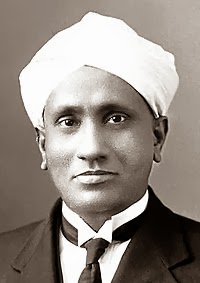Happy Birthday to Sir Chandrasekhara Venkata Raman, it would be annoying if I give you his introduction. Wouldn't it be? :P Venkata Raman was born in Thiruvanaikaval, Trichinopoly, Madras Presidency, in British India. At an early age, Raman moved to the city of Visakhapatnam, Madras Presidency (now in Andhra Pradesh), and studied in St. Aloysius Anglo-Indian High School. Raman passed his matriculation examination at the age of 11 and he passed his F.A. examination (equivalent to today's Intermediate exam) with a scholarship at the age of 13.In 1902, Raman joined Presidency College in Madras which was the best of its kind that time, where his father now was a lecturer in mathematics and physics .[6] In 1904 he passed hisB.A. (Bachelor of Arts) examination - he stood first and won the gold medal in physics. In 1907 he gained his M.A. (Master of Arts) degree with the highest distinctions. Raman got all sorts of offers from various places all over the world & could have chose them as they would offer him lots of money, but he wanted to work for his country & joined Indian Institute of Science. Brilliant from childhood, Raman did wonders at the Institute & did a lot of research there. Raman retired from the Indian Institute of Science in 1944 and established the Raman Research Institute in Bangalore, Karnataka a year later. He served as its director and remained active there until his death in 1970, in Bangalore, at the age of 82. Raman was honoured with a large number of honorary doctorates and memberships of scientific societies. But the most well known out of them was the Nobel Prize for Physics in 1930 for the discovery that when light traverses a transparent material, some of the deflected light changes in wavelength. This phenomenon is now called Raman scattering and is the result of the Raman effect. Raman was the paternal uncle of Subrahmanyan Chandrasekhar, who later won the Nobel Prize in Physics (1983) for his discovery of the Chandrasekhar limit in 1931 and for his subsequent work on the nuclear reactions necessary for stellar evolution. His greatness doesn't need any proof & the fact that India celebrates National Science Day on 28 February of every year to commemorate the discovery of the Raman effect in 1928 tells the whole story. C.V. Raman was the greatest Indian physicist whose work was influential in the growth of science. He was known as the Indian Einstein & is respected all over the world. Google has made a doodle today for his 125th birthday & he will be remembered till Science lasts.


No comments:
Post a Comment